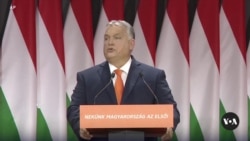Hungary is threatening to block $50 billion of European aid for Ukraine and veto Kyiv’s EU membership bid, amid a spiraling dispute between Brussels and Budapest.
EU Council President Charles Michel traveled to Hungary on Monday for talks with Prime Minister Viktor Orban, in a bid to calm relations ahead of a crucial summit scheduled December 14-15, where EU heads of state are expected to decide on opening formal talks with Ukraine over its accession to the bloc. Neither Michel nor Orban spoke to the press following Monday’s meeting.
Hungary has long been a thorn in the side of the European Union. The dispute over the bloc’s military and economic support for Ukraine comes amid increasingly bitter rhetoric as campaigning gets underway for next June’s European elections.
Anti-EU campaign
Prime Minister Orban’s Fidesz party this month launched a personal attack against European Commission President Ursula von der Leyen, putting up billboards showing her alongside Alex Soros, the son of the liberal Hungarian-born financier George Soros - another favorite target of Fidesz campaigns. The slogan on the posters reads: “Let's not dance to their tunes.”
Addressing members at the Fidesz party congress November 18, Orban stepped up his attacks on the EU.
“I am deeply convinced that we must say no to the Brussels’ Europe model. We must say no because it is unsustainable, because it has no future. I am convinced that today, in Brussels, Europe is being destroyed and led to its ruins,” Orban told supporters, before repeating his threat to veto Ukraine’s EU membership application.
“In the months ahead, right up to the European elections, we face serious political struggles… our task will be to correct the mistaken promise to start negotiations with Ukraine, since Ukraine is now light years away from the European Union,” he said.
Blocked funds
The EU is continuing to withhold around $24 billion the bloc’s post-COVID stimulus fund over concerns about the rule of law in Hungary, including the independence of the judiciary and freedom of the press. Brussels has repeatedly voiced concerns over the backsliding of democracy.
In a letter to EU Council President Charles Michel last week, Prime Minister Orban reportedly threatened to block a $50 billion dollar EU aid package for Kyiv.
Critics say his hard-line approach could backfire.
“Orban is increasingly isolated within the European Union, and it hurts. It hurts not only symbolically, but it hurts economically as well. The Hungarian economy is not in a very good shape, and the lack of the EU funds and the frozen EU funds, due to rule of law concerns, but also due to the government's outlier position in the Russia-Ukraine issue and also its EU bashing, clearly played an important role in freezing these funds,” Peter Kreko, an analyst at the Political Capital think tank in Budapest, told the Associated Press.
Ukraine’s EU hopes
The EU released $1 billion of the frozen funds last week, in an effort to overcome Hungary’s objections. It’s not clear if that will be enough to prevent Orban from wielding his veto threats at the upcoming EU summit in December.
The Hungarian prime minister has said there is no way those talks can proceed with a country at war and has urged Kyiv to seek peace talks with Moscow. Ukraine has said it will not open negotiations until Russian forces leave its territory.
“Ukrainians just don’t believe that Russia can be trusted. And that’s why they see the EU and NATO membership as the only security guarantee – not just for Ukraine, but for sustainable peace and security in Europe,” said Olga Tokariuk, an analyst with the London-based Chatham House.
Analysts say Orban could be emboldened by the recent election victories of Robert Fico in Slovakia and Geert Wilders in the Netherlands, both like-minded leaders who have voiced skepticism of EU support for Ukraine.





